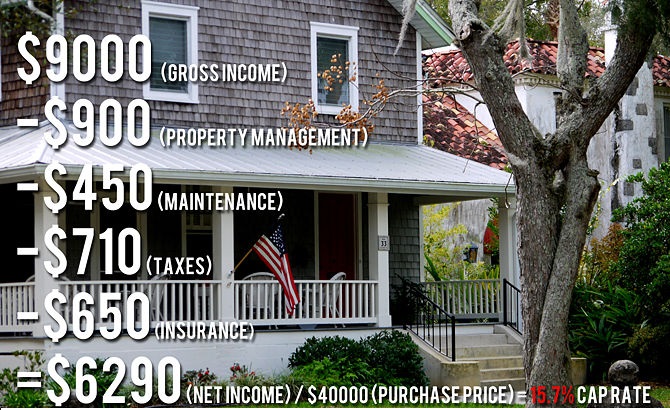Cap rate is (annual rent - property tax - maintenance expense - management expense) / current-market-value.
Mortgage is not a factor.
Use current market value, not the purchase price.
Cap rate is (annual rent - property tax - maintenance expense - management expense) / current-market-value.
Mortgage is not a factor.
Use current market value, not the purchase price.
management refers to HOA not property manager.
only making decision then use market value, once bought, we use purchase price.
Have to use current market price. If you use the price from 30 years ago, cap rate would be though the roof
Doubt it. Did you do any computation yet? You’re assuming other expenses don’t have inflation. For example, replacing roof may cost $10k for crappy roof, 10 years later could be $15k.
Are you using the purchase price or current market price? There’s a huge difference
This is the way

Why use current market price? I didn’t buy those houses at current market price and also paying much less property taxes than I would if I were to buy at current market price.
I keep $100/month/house flat rate on Reserves cover long+short term repairs as bigger expenses are amortized by taxes.
Standard definition? The property management means HOA right, not the property management company that one employs to help you do PM.
I use the purchase price. If selling use the sale price and the expected property tax.
This is the standard definition
Cap rate = Net operating income / Current market value (Sales price) of the asset
If you bought a house for 30k in 1965 and now renting for 4k a month, is your cap rate 150%? Cap rate is used to compare with alternative investments at the time of calculation.
https://economictimes.indiatimes.com/definition/capitalization-rate
Yes you do have a point. Cap rate needs to take into account the opportunity cost for not selling. That 1965 house you bought should have a low cap rate because it’s telling you that it more worthwhile to sell it than keep holding on to it 
yes. If the 10 year yield is 10% and your 1965 purchase only delivers 1.5% cap rate at today’s price, it gives information to act upon. But if you thought your cap rate is really 150%, you’ll never consider other alternatives.
But if you plan to never sell, you don’t need to calculate cap rate after purchase.
Exactly. Is why I keep saying use cashflow to compute whether it is worthwhile to invest because you’re not comparing alternatives. Frankly, I don’t care about cap rate much, because you guys keep talking about it, I just talk about it. IMHO, cashflow is the real deal.
For me, cash flow is not the real deal. Appreciation is.
The problem with using current value, is first it is hard to know. Second if you sell the tax on a 1965 property will be 35% state and federal so the after tax cap rate is what really counts unless you can 1031
Clearly didn’t do your computation. Are you talking about yield or cap rate? The expenses would be more than $30k. You can get $4k rent for an old house built in 1965, pulling my legs. You probably need to re-build or do a thorough re-modeling to get that rent. In fact, nobody would rent that house if no re-modeling… I guarantee you that.
How can you have a 30k expense when property tax is only $1000?
How can you have a 30k expense when property tax is only $1000?
Don’t keep using theoretical numbers, use a real house. Theoretically is BS.
None of us own a 1965 purchased property so the comparison means little. If you own property past the depreciation time, it makes sense to 1031 out. Or at least rifi into better yield investments